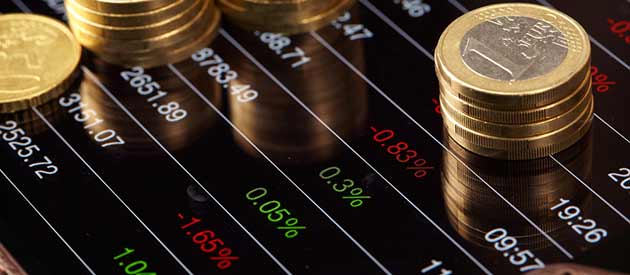The Euro could fluctuate against other currency majors in the week ahead, including the Swiss Franc (EUR/CHF), South African Rand (EUR/ZAR), Emirarti Dirham (EUR/AED) and Saudi Riyal (EUR/SAR) as Eurozone politics evolve and data is released.
Monday saw European Central Bank official Ewald Nowotny suggest that inflation could remain below 0.0% for some time.
Nowotny stated: ‘We have to be very cautious with the forecasts for inflation. I cannot exclude that also at the level of the Eurozone for some of the months to come we might have negative inflation rates.’
Earlier… Monday could be an interesting day for the Rand, with some important South African data emerging. The KAGISO Manufacturing Purchasing Managers Index (PMI) is forecast to fall in January—a development that could be a bad omen for Rand trading.
In addition, Total New Vehicle Sales are also due for release and could jump higher in January than they did in December. Predictions around the 56,473 figure would beat the December 51,461 if correct.
South African Foreign Exchange Reserves are due out on Friday, but are unlikely to massively alter the Rand to Euro (ZAR/EUR) exchange rate.
Meanwhile, the Emirarti Dirham and Saudi Riyal could both fluctuate on any changes in oil prices.
A survey conducted by Reuters inferred that oil prices will continue to slide this year. Reuters stated; ‘Crude oil will likely continue falling before posting only a mild recovery in the second half of this year […] with prices set to average even less in 2015 than during the global financial crisis. The survey of 33 economists and analysts forecast North Sea Brent crude would average $58.30 a barrel in 2015, down $15.70 from last month’s poll, in the biggest month-on-month forecast revision since prices last collapsed in 2008-2009.’
Oil reserves in the UAE are predicted to be equal to Kuwaits estimated reserves, with Abu Dhabi housing the majority. Approximately 40% of the country’s Gross Domestic Product (GDP) is closely linked to oil and gas output. Crude oil exports are estimated to be reaching 2,701 barrels a day.
As a global slowdown takes place, investors are seeking safer currencies such as the US Dollar (USD), leaving riskier currencies at the sideline. Some financial experts have suggested they expect the Saudi Riyal and Emirati Dirham to be volatile in coming months.
The Saudi Riyal fluctuated when the king of the nation died recently and investors thought the new ruler could potentially cut oil production to lower levels, therefore pushing the price higher.
However, the new monarch has suggested that production will continue on its current course. Industry expert Durwood Zaelke commented: ‘If a period of low prices gets consumers hooked on cheap gas and inefficient cars, that sustains their market.’
With oil such a major part of the Dirham and Riyal’s value, any comments from the Organisation of the Petroleum Exporting Countries (OPEC) or other oil producing nations could cause significant devaluation of the currencies.
Meanwhile, Swiss Franc trading could be interesting on Monday with the latest SVME Purchasing Managers Index. Tuesday’s Swiss Trade Balance, Imports and Exports stats may also impact the Swiss Franc exchange rate.
January’s Consumer Confidence figure will be out on Thursday and could be an interesting insight into Swiss citizen’s sentiment since the Swiss National Bank (SNB) relinquished its tie to the Euro.
Friday will finish Swiss domestic data for the week with the publication of Retail Sales and Foreign Currency Reserves stats.
Euro Exchange Rate Forecast: EUR/CHF, EUR/ZAR, EUR/AED, EUR/SAR
The Euro is likely to be sensitive to any developments regarding Greece since the recent Syrzia election win. In addition, the European Central Bank (ECB) is scheduled to publish its economic bulletin on Thursday, which could be an event that impacts the Euro exchange rate.
German and Eurozone Retail Purchasing Managers Indexes will also be out on Thursday.
Eurozone Retail Sales figures are expected on Wednesday. In the month of November they expanded by 0.6% and offered the annual figure recorded growth of 1.5%.
If Greek bailout negotiations go south, and the nation’s exit from the Eurozone becomes more of a threat, the Euro exchange rate could fall against other majors.
Final Eurozone, French, German and Italian Manufacturing PMI stats are out on Monday which could cause Euro exchange rate movement.
On Friday, the Euro to Swiss Franc (EUR/CHF) exchange rate was residing in the region of 1.0390. The Euro to South African Rand (EUR/ZAR) exchange rate was reaching 13.1476. The Euro to Emirati Dirham (EUR/AED) exchange rate traded at 4.1443. The Euro to Saudi Riyal (EUR/SAR) trended in the region of 4.2473.



